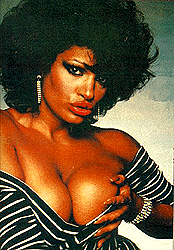In a little under a month, the IndieGoGo campaign to fund Thomas Mignone’s upcoming “Vanessa” project will close, leaving the writer/director of On the Doll to prepare for filming, which begins later this year.Produced by Sean Fernald, who helped producer Stan Lee’s Mutants, Monsters and Marvels and works with Kick-Ass co-creator John Romita, Jr., the story of a young woman who finds her way into the adult film industry against the backdrop of organized crime in the ’70s and ’80s doesn’t seem like a natural fit for comic book fans, but they’re all over the production.The Walking Dead‘s Michael Rooker calls the project “Boogie Nights meets Taxi Driver” and according to the website is being wooed to play the film’s heavy. Mignone is the latest writer to try his hand at scripting a Satanika movie, based on the comics from Glenn Danzig and Simon Bisley.The director is optimistic that the film, which has been in development since 2009, will start to move ahead, giving each of the principal players on the as-yet-untitled film, based loosely on the real life of adult film star Vanessa del Rio, comic book street cred.So, naturally, Mignone stopped by ComicBook.com to talk about the film, what he hopes to accomplish and why crowdfunding is a way forward for a filmmaker who’s won awards, shot with bands you’ve heard of and generally doesn’t have trouble getting work.You can check out the trailer for the film below, and then our interview with Mignone below that.And if you’re interested in the project, share it around. With a month to go and about half the budget to make up, Mignone is in that same position that so many crowd-funded projects find themselves in; it appears to be coasting along under its own power, but the initial burst of enthusiasm and publicity you get at the beginning of a campaign is petering out and more and more, he’s relying on the backers and the fans to really get the word out.
Director Thomas Mignone Talks The Politics and Culture Behind Vanessa del Rio
In a little under a month, the IndieGoGo campaign to fund Thomas Mignone’s upcoming ‘Vanessa’ […]














